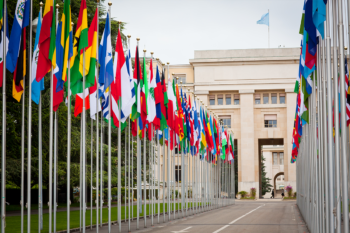 Humanists UK asked the UN High Commissioner for Human Rights what actions are being taken to ensure that Afghan resettlement programmes are inclusive of non-religious refugees following the Taliban takeover last year. It further asked what mechanisms have been put in place so these refugees can be safely identified by the UN High Commission for Refugees in neighbouring Pakistan and Iran, where they also face persecution.
Humanists UK asked the UN High Commissioner for Human Rights what actions are being taken to ensure that Afghan resettlement programmes are inclusive of non-religious refugees following the Taliban takeover last year. It further asked what mechanisms have been put in place so these refugees can be safely identified by the UN High Commission for Refugees in neighbouring Pakistan and Iran, where they also face persecution.
The call was made in a video intervention by Humanists UK’s Chief Executive Andrew Copson during a debate with High Commissioner Michelle Bachelet. Andrew said:
‘Violent intolerance of any dissenting belief was a hallmark of the Taliban regime in the 1990s, and there is no evidence of any recent change in policy. Even before its return to power last year, it was not possible to be openly non-religious in Afghanistan. Both blasphemy and apostasy were already crimes that carry the death penalty.
‘Terrorist attacks upon religious minorities – such as last month’s bombing of a Kabul mosque which killed members of the Hazara Shia community, including at least 16 children – rightfully receive international condemnation. But the plight of the non-religious remains entirely hidden.
‘Non-religious Afghan refugees are not safe. They cannot make themselves known to the UNHCR in neighbouring countries, most notably Pakistan and Iran, for fear of mob violence and arrest under the blasphemy laws there. Unlike other minority groups, who may enjoy a degree of toleration in the region, the non-religious have no safe route of passage out of Afghanistan.’
Notes:
For further comment or information, media should contact Humanists UK Director of Public Affairs and Policy Richy Thompson at press@humanists.uk or phone 020 7324 3072 or 020 3675 0959.
Read more about our international work.
Humanists UK is the national charity working on behalf of non-religious people. Powered by 100,000 members and supporters, we advance free thinking and promote humanism to create a tolerant society where rational thinking and kindness prevail. We provide ceremonies, pastoral care, education, and support services benefitting over a million people every year and our campaigns advance humanist thinking on ethical issues, human rights, and equal treatment for all.
